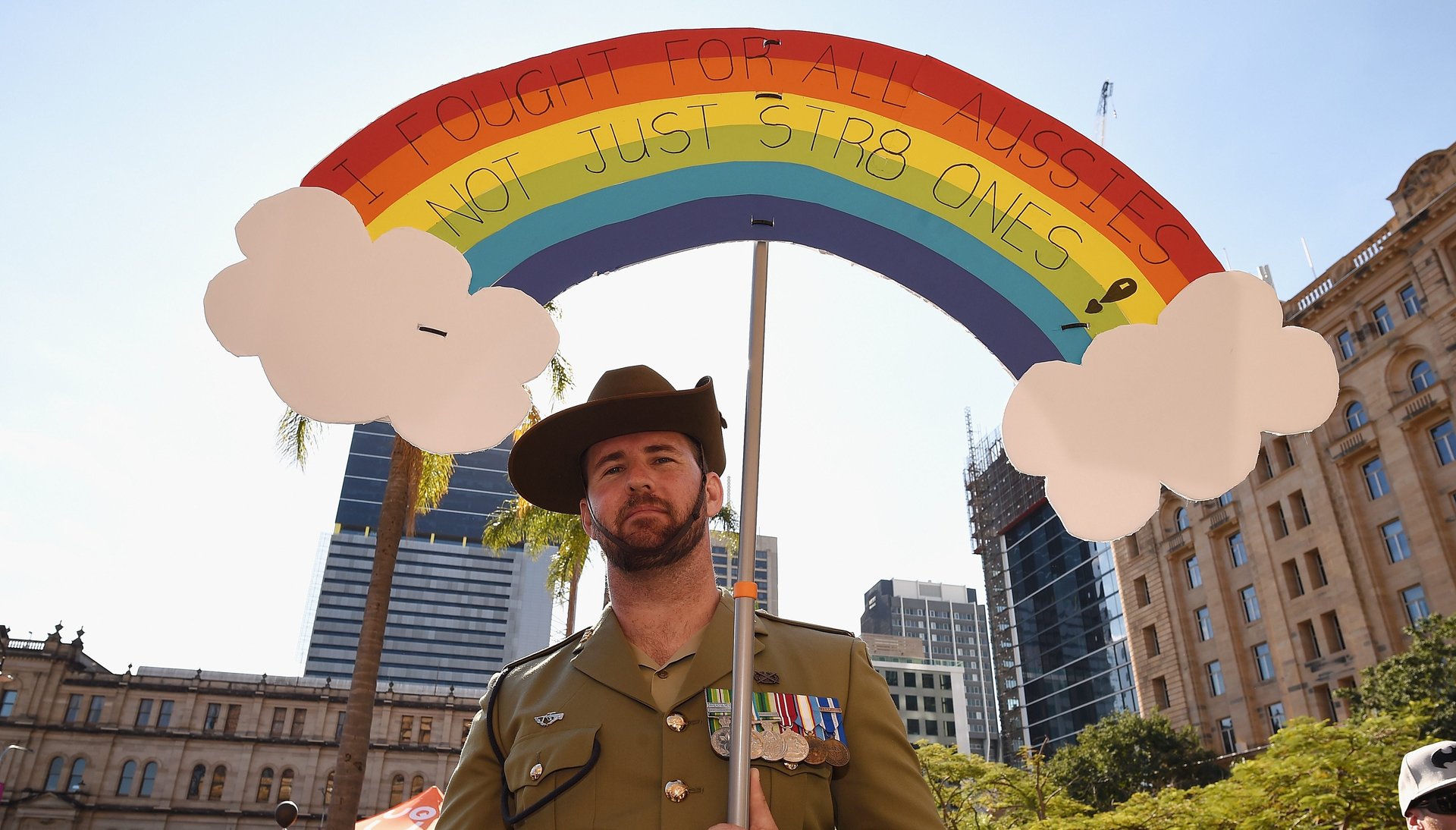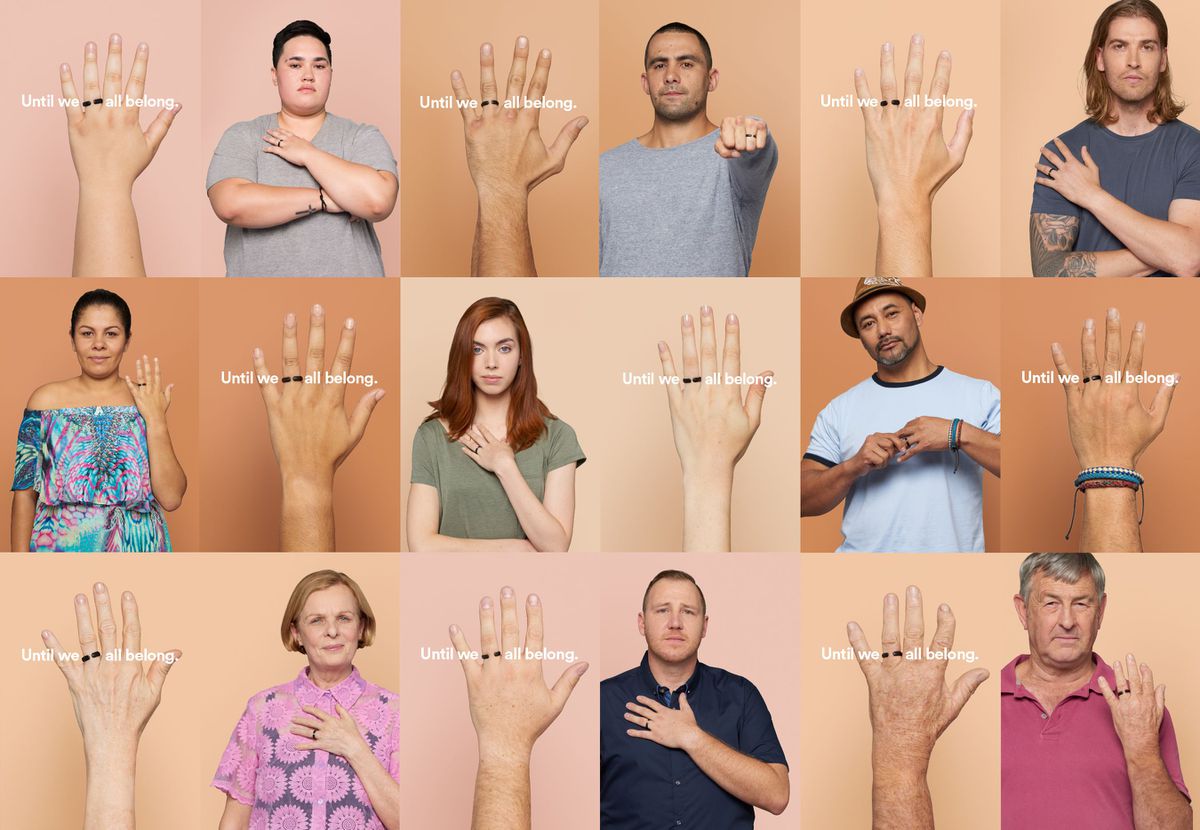Two-thirds of Australians support gay marriage, but politicians are too worried for their jobs to pass it
Sydney, Australia


Sydney, Australia
Australia is often heralded as one of the world’s most progressive nations, but stands out as a country where marriage equality remains elusive.
There is certainly no lack of public acceptance of same-sex relationships. Support for marriage equality stands at a record two-thirds of the population. Prime minister Malcolm Turnbull, a social liberal, also supports marriage equality. But Turnbull—and same-sex marriage—are being held hostage by conservative forces in the political arena in Australia’s capital, Canberra.
“It is the world of politics that is failing to reflect the values of the Australian people,” said Tiernan Brady, the director of the Equality Campaign in Australia who spearheaded the push for marriage equality in Ireland, which legalized it in 2015.
“Australia entrenched discrimination in the Marriage Act as the rest of the world was moving on,” Penny Wong, Australia’s first female, openly gay federal parliamentarian, recently wrote, referring to a 2004 amendment to the law that specified marriage was between a man and a woman.
Since then, 21 same-sex-marriage related bills have been introduced into parliament, all of which have failed. During that time, over 20 other nations have made marriage equality a reality, including the US, the UK (excluding Northern Ireland), and Canada. New Zealand, Australia’s neighbor, legalized same-sex marriage in 2013. Elsewhere in the region, Taiwan is currently debating marriage equality, and could become the first place in Asia to legalize it.
Turnbull faces a balancing act. He leads a divided party after taking over as prime minister from Tony Abbott in 2015, a conservative who once studied for the priesthood. He must corral his own Liberal party members, some of whom still support a return of Abbott to the job. The 2016 election also returned Turnbull’s Liberal-National Coalition government with such a slim majority that his own standing within his party is weak. The election result means Turnbull must woo a disparate band of populists in the senate, many of whom don’t support marriage equality, to pass laws.
For now, the prime minister is committed to the plan of holding a non-binding referendum over the issue, an idea that was floated by the Abbott government. It is a controversial and unpopular move. Critics argue it would be costly and divisive, and are calling instead for parliament to vote on the issue—a study conducted last year found that the marriage equality referendum in Ireland had a “highly detrimental” effect on members of the LGBT community. Nor is there enough parliamentary support for Turnbull to pass a bill in order to hold a referendum, leaving the process all but dead in the water. Turnbull has said that if the plebiscite isn’t held, marriage equality will likely be off the agenda until the next federal election—due in 2019.
“Until we all belong”
Now, a coalition including unions, local councils, and community groups—spearheaded by a push from some of the best-known companies in the world—is hoping to break the impasse over marriage equality.
“We’re in new territory on this journey and politicians can no longer avoid the momentum,“ said Alex Greenwich, co-chair of Australians for Marriage Equality. “The campaign has never been stronger and never had so much support.”
Global companies like American Express, Procter & Gamble, GE, Google, and eBay have all voiced their support for marriage equality in Australia. Airbnb, for example, recently launched a campaign called “Until we all belong,” which asks people to wear an incomplete ring symbolizing the “gap in marriage equality that we need to close.” CEO Brian Chesky said in a statement he hoped the initiative would put marriage equality on the top of the nation’s political agenda.
“Business has stepped up and shown real leadership”, said the Equality Campaign’s Brady.

The chief executives of 30 of Australia’s largest companies, including Qantas and Commonwealth Bank of Australia, also argued in a recent letter to Turnbull that marriage equality makes good business sense.
“We urge you to legislate for marriage equality,” said the letter. “Equality and diversity are strategic business issues.”
Coopers Brewery, Australia’s largest domestic beer-maker, learned that lesson the hard way. It was recently forced to distance itself from The Bible Society, an organization opposed to same-sex marriage, after the group used Coopers Brewery beer in a video discussing the topic. A social media backlash followed and several bars in Sydney and Melbourne took the beer off tap in protest.
Coopers Brewery subsequently publicly endorsed same-sex marriage and apologized for their involvement with the Bible Society.
“Stick to your knitting”
Conservative critics argue that companies have been coerced into accepting marriage equality out of fear of a public backlash.
Peter Dutton, Australia’s immigration minister and a conservative politician in Turnbull’s party, told the CEOs involved in the same-sex marriage push to “stick to their knitting.”
“The reality is that some companies are morally coerced into supporting campaigns in fear of being extorted by an online social media push to boycott their product,” he said. “[Companies should] stop shoving politically correct nonsense down our throats.”
Another politician Turnbull must negotiate with is the staunchly conservative senator Cory Bernadi. Bernadi recently left the Liberal party to start his own party, the Australian Conservatives, and has in the past linked same-sex marriage to bestiality.
Turnbull has so far rebuffed the efforts of the chief executives, saying he won’t change course on same-sex marriage.
“We have a commitment on a plebiscite, which we took to the election—that’s our policy,” Turnbull said last month. “The way to ensure gay marriage is allowed is to have a plebiscite.”
Australian campaigners, however, remain upbeat.
Alex Greenwich from Australians for Marriage Equality, who married his partner in Argentina in 2012, said they are focused on the bigger picture.
“I understand people are frustrated,” he said. “But remember our current position is not the destination.”
Penny Wong, the openly gay politician, agrees. “Australians no longer ask, ‘Why?’ They ask, ‘Why not?’”